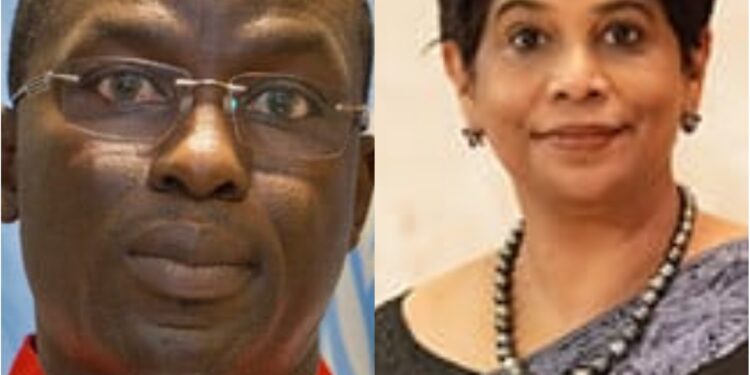Now International Criminal Court Prosecutor Karim Khan QC will have two deputies after the Assembly of States Parties elected them during the final day of its 20th session at the World Forum Convention Centre in The Hague.
Nazhat Shameen Khan (Fiji) and Mame Mandiaye Niang (Senegal) were picked on December 10, 2021 by the representatives of the 123 states parties that are members of the assembly.
With the election of the two deputies, one for investigations and one for prosecutions, the system of the initial years of the ICC has been restored. In recent years, the court has had only one deputy prosecutor, James Stewart of Canada.
Niang won during the third round of voting with 67 votes, having passed the required majority of 62 votes. He was elected from List B, one of the two lists that had been presented by the Prosecutor. The other two names on the list were Claudia Paz y Paz Bailey (Guatemala) and Alex Whiting (France).
The voting went to the third round because none of the candidates received majority votes in the first and second rounds.
Khan reached the majority requirement of 62 votes during the first round of voting. She was selected from List A, whose other members were Sylvia Domaradzki (Canada) and Paolina Massidda (Italy).
The voting, starting with List B, took place during the nineth plenary meeting chaired by the President of the Assembly of States Parties (ASP), Silvia Fernández de Gurmendi.
The deputy prosecutors were elected in a secret ballot by an absolute majority of the member states parties. The required majority was 62. Only 123 states parties to the Rome Statute were entitled to participate in the election.
The new deputy prosecutors will serve for a nine-year term commencing on the day they are sworn in, termed solemn undertaking.
The Prosecutor had presented two lists to the ASP: one with female candidates only, and one with only candidates that are francophone or from a civil law country. This was meant to ensure gender balance, and also that the two principal legal systems of the world – common law (which has its origins in the English system) and civil law (the Roman/French tradition) – are represented in the three-person Office of the Prosecutor leadership. It was also to make sure that somebody in the leadership team speaks good French, one of the two working languages of the court.
Niang has 34 years of national and international experience, and has served in ad hoc tribunals as a senior legal officer.
He served as a trial attorney (1993-1997) in the office of the Prosecutor General of the Supreme Court of Senegal.
He was a member of the investigating team (1997-2000) of the International Criminal Tribunal for Rwanda (ICTR) and in 2011 served as the United Nations Office on Drugs and Crime (UNODC) regional representative for Southern Africa. He was elected judge of the ICTR and the International Criminal Tribunal for the former Yugoslavia (ICTY) in 2013, where he sat in both the trial and appeals divisions.
He served as the Director of Criminal Affairs and Pardons in Senegal’s Ministry of Justice (2016-2020) and was a member and reporter of the Senegalese Law Revision Commission and an expert member of the Senegalese Committee of Human Rights, as well as a member of the Senegalese section of the International Association of Criminal Law.
He lectured in criminal law at the École Nationale des Assistants et Éducateurs Spécialisés (Training School for Educators and Welfare Officers), and was an expert/resource person of the Réseau Africain pour le Développement Intégré and the Senegalese Centre de Formation Judiciaire.
He was a visiting lecturer of international humanitarian law at the Université du Rwanda and at the Senegalese Centre de Judiciaire.
He has published over 20 articles in selective law reviews, both in English and French, and also co-authored several books in international humanitarian law.
He is a statutory member of the Conseil Supérieur de la Magistrature (Senegal’s governing body of the judiciary).
Khan has more than 30 years of experience as a practitioner in criminal law and is the president of the United Nations Human Rights Council (HRC) in Geneva for the duration of 2021.
Since May 2014, Khan has been the Permanent Representative of the Republic of Fiji to the United Nations in Geneva, Switzerland, and Vienna, Austria, and ambassador to Switzerland.
She was the first woman in Fiji to be appointed a Crown Prosecutor, the first woman to become the Director of Public Prosecutions, and the first woman to be appointed a High Court judge.
Prior to her diplomatic appointment, she was a private legal practitioner and legal consultant in Fiji, operating as Nazhat Shameem Consultant since May 2009.
Her ambassadorial duties at the UN include providing advice to the government of Fiji and its agencies on human rights commitments and implementing human rights conventions and protocols in accordance with international obligations.
She has a Bachelor of Arts in Law from the University of Sussex, United Kingdom, a Master of Law from the University of Cambridge, and a Master of Philosophy in criminology from the University of Cambridge. She was called to the Bar as Barrister of England and Wales of Inner Temple in July 1983.







